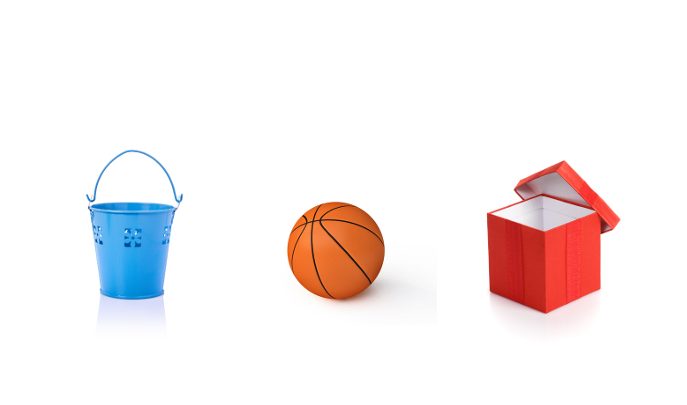Get hands on with the alphabet with these 5 ideas for exploring alliteration

Bouncing balls, blue buckets and brilliant boxes all have their place when it comes to the wonderful world of wordplay, says Kirstine Beeley…

- by Kirstine Beeley
- Early years training consultant with 20 years of experience Visit website

Literacy outdoors is not about laminating signs and hanging them up everywhere.
It’s about spotting opportunities to explore letters and sounds within children’s play. It’s about enabling the environment with invitations to play and then looking for opportunities to play alongside the children to explore the initial sounds of items.
1 | Mud mixing
Sometimes adding a few ingredients to your mud kitchen can lead to lots of alliteration exploration. Maybe try providing mint, mushrooms, mango, melon, milk (white paint in water) and mustard (yellow paint and cornflour), and of course mud one day.
Or try adding ingredients beginning with another sound to encourage children to create and mix their own alliterative pies and soups as they play.
2 | Beans in boxes
The key to getting children to both do and understand in all areas, including literacy, is to make learning integral to exciting activities that by virtue of being open-ended offer access to a range of skills and knowledge, not just one narrow learning objective.
Developing resources that are open-ended and appealing allows children to inquire and develop skills as well as giving opportunities for adults to scaffold literacy understanding, eg filling a tray with lots of beans (butter beans, haricot beans, coffee beans, etc) and providing scoops, spoons, bottles, buttons and boxes (gift type) of different sizes lends itself to fine motor play, maths exploration and exploration of ‘b’ sounds as you fill your bottle or box with buttons, beads and beans.
3 | Cups and cakes
It is worth looking around your continuous provision to see if there are any resources that you can add to areas to promote alliterative talk.
A self-service play-dough bar can be resourced with a selection of cake cases, candles, cups, conkers and corks; a selection of nuts, bolts, jar lids and paper clips can lead to lots of discussion about metal and magnets that make machines.
Try a cutting tray with scissors, lilac, lavender and lace, or a scooping tray with red rice, ribbons and rose petals.
The key is to engage children in the process of the activity and then to look for sensitive opportunities to point out alliterative possibilities, rather than planning a task with a specific outcome or a photocopied worksheet.
4 | Brilliant books
The more we share stories in a relaxed, calm environment and talk about what we’re reading, the more children will want to read, and the more letters and sounds will make sense.
Lots of lovely children’s stories have alliteration at their heart and many offer loads of opportunities for children to revisit the sounds in their play or in their retelling of the stories.
My favourite is Billy’s Bucket, which lends itself brilliantly to lots of exploration of buckets of all sizes and shapes, as well as encouraging children to fill their buckets with ‘b’ sounds. Pig in the Pond is another lovely example, as is Pass the Jam, Jim and Happy Hedgehog Band (which also offers lots of opportunities to explore rhythm and sounds).
5 | Socks in sand
Introduce socks of all different sizes, patterns and materials to your sand tray to unlock countless opportunities for maths talk and literacy learning without the need for laminated numbers, letters or other ‘over-directed’ resources.
Spooning sand into the socks lets children explore capacity, length, weight and size, while inviting play with words that begin with the same sound. Enjoy exploring your soggy, stretchy, stripy or spotty, soft, small socks in sand!
An enthusiastic adult is key here to encourage children to find other ‘sss’ things to put in their socks.
Kirstine Beeley is an author and educational consultant.










